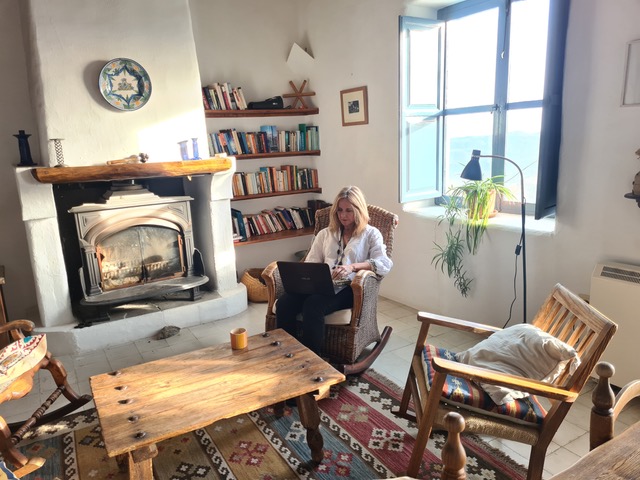We are sent what we need. So it proved recently when I finished an eight-week mindfulness course with the inspirational Anna Black, teacher and author of Living in the Moment with Mindfulness Meditations. I suspected she believed in the healing power of words as she had introduced several poems on our course.
As I was leaving her class one rainy Tuesday evening recently, I told her that I shared her enthusiasm for poetry. It transpired that she had written a dissertation looking at the therapeutic role of poetry in the teaching of mindfulness as part of her Masters from the School of Psychology at Bangor University.
She too believes that poetry can alleviate suffering. Primitive people used chants in pre-literate times to encourage healing and change, while the ancient Greeks appreciated the power of words. The first century philosopher Longinus believed in language's ability to transform reality. By 1969 the Association of Poetry Therapy had been established in the USA. "I've found listening to poetry can help in many different ways in my work as a mindfulness teacher," Black says. "Discussing possible and different meanings of a poem gives participants a sense of the variety of possible responses to an experience. Then there's the way poetry can allow people to discuss difficult feelings at one remove via the poem - there is a sense of safety because of the distance, especially if the poet uses metaphor. Finally, poetry can give people words to describe their experience they may otherwise struggle to find."
Poetry can also help by reminding those who struggle with anxiety or depression to be in the present. Listening to someone reading poetry aloud is particularly helpful as it engages our senses - sight and sound - and stops our mind from wandering elsewhere. "We are all caught up in the busyness of today," says Black. "Poetry can work in the same way as mindfulness by reminding people of the importance of being in the present moment." Regretting the past and worrying about the future are key characteristics of depression. My own favourite poem which helps me stay in the moment is Raymond Carver's "Happiness". It describes the simple joy of a boy and his friend doing their morning paper round in the beauty of the early morning light.
"Such beauty that for a minute
death and ambition, even love,
doesn't enter into this.
Happiness. It comes on
unexpectedly. And goes beyond, really,
any early morning talk about it."
Beating depression
Black says she has found the most helpful poems tend to be short and in the first person, which therefore avoids abstraction and can elicit strong feelings. In the end, this is probably poetry's most important function in her classes. Poems can work to provide feelings of relief, but a negative response can also be helpful. Choosing the right poems is crucial: a sad poem needs to conclude with a message of hope.
"The most successful poems prompt participants to make comparisons with their own feelings and raise their own awareness," she says.
On her course, Black introduced me to the thirteenth-century Persian mystic Rumi's "The Guest House". This uses the metaphor of rolling out the red carpet for unwelcome as well as welcome visitors, and begins:
"This being human is a guest-house
Every morning is a new arrival."
"This poem works really well because of its simple but expressive language," Black says. "The metaphor is one that can be easily remembered and powerfully conveys the message that we need to welcome all internal experiences."
'The Guest House" keeps repeating the same message: much of therapy is the invitation to try and change long standing patterns which have become entrenched over the years. By learning a poem and repeating its lines, we can help change such patterns by creating an alternative message which we can experience again and again through the words of the poem.
Rumi's poem also stresses acceptance, a key message of mindfulness. We are not trying to fix things: the more we accept experience and strong feelings, the less frightening they are.
Finally, 'The Guest House" encourages being curious about feelings, be they sad or happy, another key tenet of mindfulness.
The last verse concludes:
"Be grateful for whoever comes,
because each has been sent
as a guide from beyond."
The famous exponent of mindfulness Jon Kabat-Zinn also believes that verse can be helpful in the therapeutic process as it can elicit strong feelings. It is when we acknowledge our feelings that we can embark on change. In Coming to Our Senses, he says that poetry can act as a lens that "[enhances] our seeing... our ability to feel the poignancy and relevance of our own situation" - the key word being 'feel'. Hyperion, 2005 This was certainly crucial for me. Depression had numbed me of an ability to feel which poetry re-awakened, providing a rip in the curtain to let feeling back in.
Stirring up emotions
Ironically, it may be the more challenging poems which are the most helpful. Kabat Zinn continues: "What we see through the lenses may discomfort and disturb and perhaps those are the poems that we most need to linger with because they reveal the ever-changing spectrum of light and shadow that plays across the screens of our own minds. "
But poetry must be handled with caution. Former Poet Laureate Andrew Motion describes poems "as a hot-line to our hearts, and ... we forget this emotional power at our peril. Poetry is always a primitive and visceral thing."
Black echoes Motion's caveat: she warns that poetry can stir things up, its impact magnified by the way poetry may tap into the unconscious mind through repetition and rhythm, activating the right side of our brains which responds to emotion.
My own experience is that poetry can indeed be deeply unsettling in the way that it takes us out of heads and into our hearts. It was only months after I had recovered from a severe depressive episode that I was able to read the American poet Anne Sexton's deeply haunting "The Sickness Unto Death" in which she describes her desolation. She was later to commit suicide.
"God went out of me
as if the sea dried up like sandpaper
as if the sun became a latrine."
Despite the unsettling nature of her work, in another way the poem was calming. Paradoxically by drawing attention to strong and terrifying feelings, the poem allows us to co-exist with them. As devastating as it is to feel depressed, it is what it is. Acknowledging feelings of terror ironically makes them less frightening. Another consolation I found was poetry's ability to remind us of the universality of the human condition. Depression is isolating: poetry transports us to the community of all humanity.





